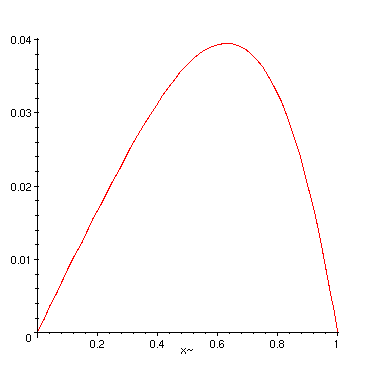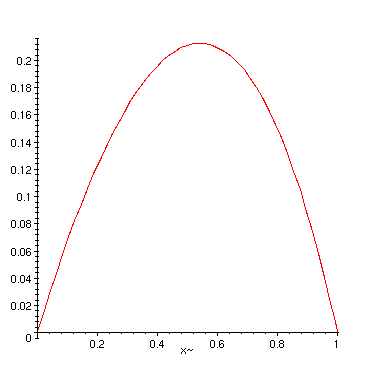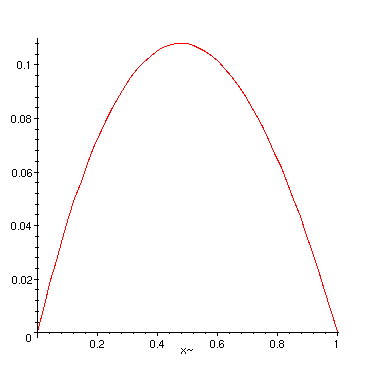First we define the Green's function for the ODE:
> G:=(x,y)->piecewise(y>=0 and y <=x,y*(1-x),x<=y and y<=1,x*(1-y));
![]()
and then the solution of the ODE using the Green's function is given by:
> x:='x':f:='f':sol:=int(G(x,y)*f(y),y=0..1);
![[Maple Math]](images/h3ex2_22.gif)
Limit the range of x:
> assume(x>0);additionally(x<1);
Define ODE for the dsolve:
> ode:=-diff(v(x),x$2)=f(x);
![[Maple Math]](images/h3ex2_23.gif)
First case:
> f:=y->y*y;
![]()
> u:=eval(sol);
![]()
Let's try to use dsolve to see if it gives the same solution:
> sol2:=dsolve({ode,v(0)=0,v(1)=0},v(x));
![]()
OK. Solutions are the same. Let's verify the solution by differentiating and evaluating u(0) and u(1):
> -diff(u,x$2);
![]()
> subs(x=0,u);
![]()
> subs(x=1,u);
![]()
Finally here is a plot of the solution:
> plot(u,x=0..1);

Second case:u(0);
> f:=y->exp(y);
![]()
Maple does not show the argument of exp, is it a bug? Anyway the internal representation seems to be correct. Solution with Green's function:
> u:=eval(sol);
![]()
Solution with dsolve:
> sol2:=dsolve({ode,v(0)=0,v(1)=0},v(x));
![]()
Verification:
> -diff(u,x$2);
![]()
> simplify(subs(x=0,u));
![]()
> subs(x=1,u);
![]()
Plot of the solution:
> plot(u,x=0..1);

Third case:
> f:=y->cos(a*y);
![]()
> u:=eval(sol);
![]()
Solution with dsolve:
> sol2:=dsolve({ode,v(0)=0,v(1)=0},v(x));
![]()
Verification:
> -diff(u,x$2);
![]()
> simplify(subs(x=0,u));
![]()
> subs(x=1,u);
![]()
Plot of the solution:
> plot(subs(a=1,u),x=0..1);

>